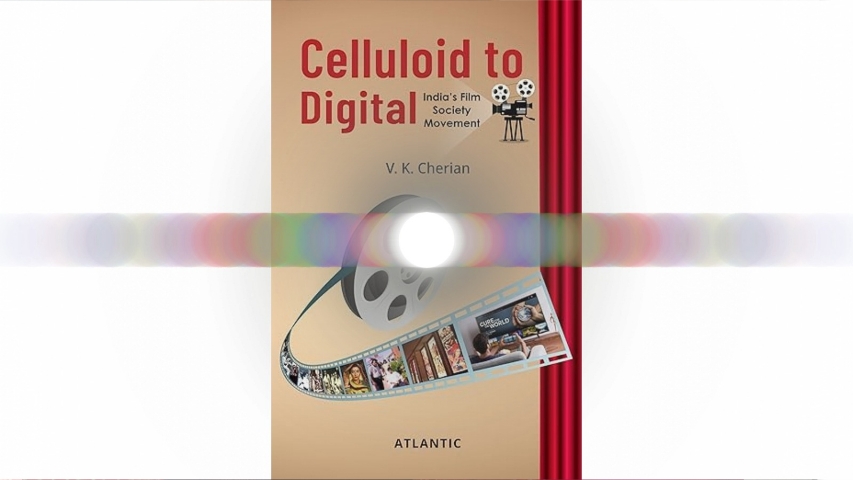
KALEIDOSCOPE: CELLULOID TO DIGITAL BY V.K. CHERIAN, BOOK REVIEW
by Monojit Lahiri July 6 2024, 12:00 am Estimated Reading Time: 4 mins, 2 secsDespite the cynical and sceptical times we live in, there are indeed many people who honestly enjoy movies, know the difference between good and bad, and care a great deal about the difference, writes Monojit Lahiri.
Over a hundred years ago, an iconic visionary declared, “Art thrives on debate, discussion, exchange of views, differing standpoints, dissonance, examining and exploring form and content, unconventional but sophisticated and complex ideas that challenge the mind and question all that is static. It can be cathartic, yet uplifting; it cuts as it curves.”
V.K. Cherian’s book is a fascinating and revealing eye-opener for anyone keen to know about the real source, backstory, and driving force that shaped and formed our rich, parallel/alternative cinema. It is India’s first comprehensive account of the decade, an eventful journey of the FILM SOCIETY movement. The author sketches its role in the creation of a cinema that embraced social significance and artistic excellence in a seamless fusion; presenting a modern, humanistic perspective way more meaningful than the fantasy-driven material forever catering to the lowest common denominator.
The author has engagingly captured the history of the FILM SOCIETY (FS) movement, from its earliest days to its near fade-out. Since change is the only constant, the author believes it’s the digital revolution that killed the FS movement, tragically wiping out the joy of collective viewing of evolved, discerning minority audiences - a sizable number, especially in Kerala and Bengal - forever pining for material that goes beyond populist armpit rhetoric, hysterical hammering, or mind-destroying posturing.
It is important to remember that over time, apart from thousands of converts in the audience space, the Film Society movement also influenced several respected filmmakers of our industry who have brought laurels, prestige, and honour to our country. The names include Satyajit Ray, Shyam Benegal, Adoor Gopalakrishnan, Aravindan, Girish Kasaravalli, Aparna Sen, Gautam Ghosh, Buddhadev Dasgupta, Basu Chatterjee, among others. It wouldn't be inaccurate to say that before the FS movement, we were like frogs in a well.

The FS phenomenon opened the floodgates to a whole new world and proved that film is made for images, and images are best when they are free to evoke emotions and associations not necessarily tangent to feel-good happy endings, or narrowly defined purposes. That there are foreign directors and films that are uniquely and thematically innovative.
Working with modest budgets, this fraternity explored political and personal relationships that recreated the fantasies and philosophies that fascinated them. Also, unlike mainstream fare, the heroines of these films are not categorized. They are not overplayed, overdressed, sliding into easy character stereotypes. They don't offer such easy and simplistic signals. Audiences instead see a range of emotions connected to the linear truth - not high-voltage histrionics created for effect. We are all party to her fears, fantasies, and desires. Nothing stagnates, and no one is readable at a glance. Such films mesmerize us by expanding and sharing the female's complex identities rather than limiting them. Perhaps the greatest aspect of European cinema, unlike Bollywood and Hollywood mainstream, is that the actress is a woman, not a little girl. She could be desirable and intelligent, mysterious and direct simultaneously; no surrendering to clichés.
In all truth, most good movies are about the style, time, and vision of their makers. A director will strike a chord in your imagination, and you will be compelled to seek out his other films that soon become like friends. To the evolved and educated FS addict, Bunuel is delighted by the shamelessness of human nature, Scorsese is charged by the lurid possibilities of Catholic guilt. Kurosawa celebrates characters in a country that suspects them. Wilder is astonished by the things people will do to be happy. Keaton is about the war of man's spirit against the physical facts of the good earth. Hitchcock creates images that have the quality of edgy, guilty dreams.
At the end of the day, the evolved, perceptive, and insightful FS devotee will understand one definitive fact: films are not about moving, but how much they have moved us.
In conclusion, a big silent thank you to the founding fathers of the Film Society movement, Shri Satyajit Ray, Chidananda Dasgupta, and Hari Dasgupta to name the front runners and...for Cherian, a huge bravo for a very critically important and significant piece of work for all interested in serious cinema that positions itself as an agent of change.
You can buy the book here:




-173X130.jpg)

-173X130.jpg)
-173X130.jpg)

-173X130.jpg)
-173X130.jpg)
-173X130.jpg)